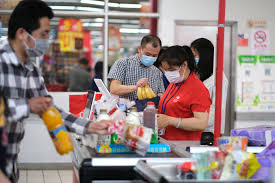>>REAL-TIME UPDATES IN THE WIRE. CLICK HERE<<<
China’s consumer price index hit a two-year high in July as pork prices rebounded, according to official data released Wednesday.
The headline consumer price index rose by 2.7% in July from a year earlier, according to data released by the National Bureau of Statistics on Wednesday, the highest since May 2020, up from 2.5% growth in June and missing expectations for a 2.9% increase expected by analysts polled by Reuters.
Food prices rose 6.3% on year in July, accelerating by 3.4 percentage points from the previous month, contributing about 1.56 percentage point growth of the CPI growth, showed the data.
Prices of pork rose by 20.2% in July from a year ago, marking the first increase since September 2020, compared to 65 drop in June, showed the data. Pork prices posted their largest month-on-month surge on record — up by 25.6%, the data showed. Prices of vegetables and fruit rose 16.9% and 12.9%, respectively, in July from a year earlier.
Non-food price rose 1.9% from a year earlier, slowing by 0.6 percentage points from June. Prices of gasoline, diesel and liquefied petroleum gas rose 24.6%, 26.7% and 22.4%, respectively.
Excluding food and energy, China’s core CPI rose 0.8% in July from a year earlier, slowing by 0.2 percentage points from the previous month, according to the NBS.
The Covid outbreaks in many cities and the lack of further policy stimulus may have led to weaker growth in July.
“Non-food prices actually declined in July [by 0.1%] from their June level, which reflects weak demand,” Zhiwei Zhang, president and chief economist, Pinpoint Asset Management, said in a note. “The Covid outbreaks in many cities and the lack of further policy stimulus may have led to weaker growth in July.”
The producer price index (PPI), which reflects the prices that factories charge wholesalers for products, also fell short of expectations after slowing for the ninth consecutive months to 4.2% in July year on year, decelerating from a rise of 6.1% in June. That missed the Reuters’ poll forecast of 4.8% growth.
Price levels in oil and non-ferrous metal industries continued to rise year on year in July, though at a slower pace, while prices in the ferrous metal smelting industry declined by 9.5% in July, faster than the drop in the previous month, showed the data.
“We think factory gate inflation will remain on a downward trajectory throughout the rest of the year amid a further drop in commodity prices, easing supply bottlenecks and a higher base for comparison,” said Huang Zichun, Chines economist at Capital Economics.
China’s CPI will rise by 2.8% year on year in August and peak at “slightly above” 3% in September, while PPI inflation will continue its downtrend over the next few months, said Lu Ting, chief China economist at Nomura, in a note.
“We do not see rising CPI inflation as a constraint to Beijing maintaining its pro-growth plicy stance, as core CPI inflation remains subdued,” he said. “Falling PPI inflation also points to limited potential upside to CPI inflation.”
Last month, China’s factory activities unexpectedly contracted despite recent signs of moderate recovery, while the official manufacturing purchasing managers’ index sliding from 50.2 in June to 49 in July.

